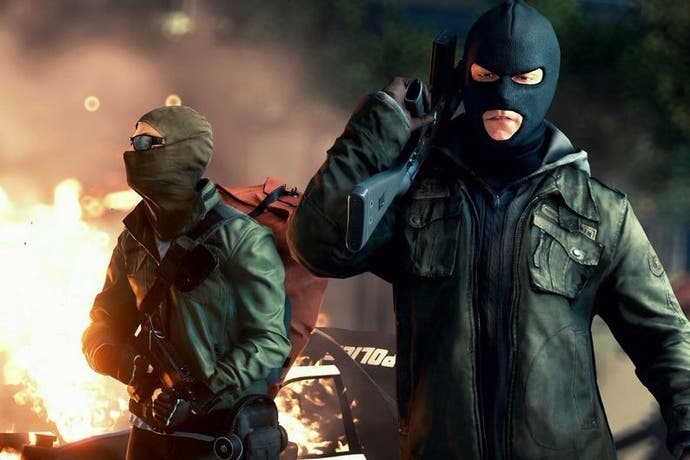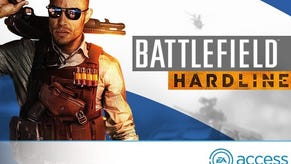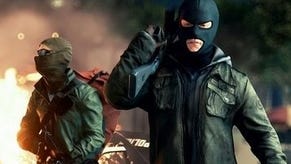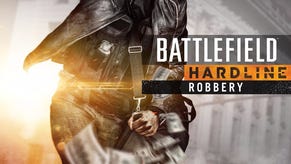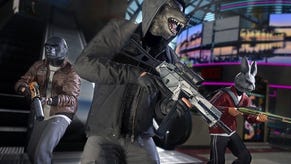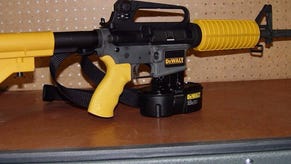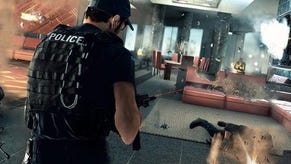Battlefield Hardline review
A fair cop?
The traditional nostalgic view of boys at play is that old playground classic of 'war', where kids pelt around the tarmac making "akka-akka-akka" noises and pretending to shoot each other with machine gun sticks. The alternate to that scenario is, of course, cops and robbers, so it makes sense that for its first foray outside of the military milieu Battlefield would swap tanks for squad cars.
We've already taken a look at Hardline's campaign, so won't be wasting any more time on it for this review. Suffice to say, for all its TV cop show presentation, it's a disappointingly limited, linear and lifeless effort that favours clunky stealth over full-blooded action. At best, you'll hammer through it in order to earn a stack of bonus Battlepacks for use in the real meat of the game: multiplayer.
While the campaign at least pays lip service to the idea that you're playing as an officer of the law, giving you the option to arrest enemies for more XP but not really caring if you shoot them in the back either, such details are absent from online play. Here, it's kill or be killed, due process be damned. If you shoot a criminal in the head with a sniper shot from 100m, or grind him to paste under the wheels of a truck, it's all good.
In some respects, this decision to stick with Battlefield lore rather than the rule of law is a sensible one. The Battlefield experience is still incredibly entertaining, and it's understandable that Visceral Games, inheriting the mantle from creators DICE, has opted not to change the fundamentals too much.
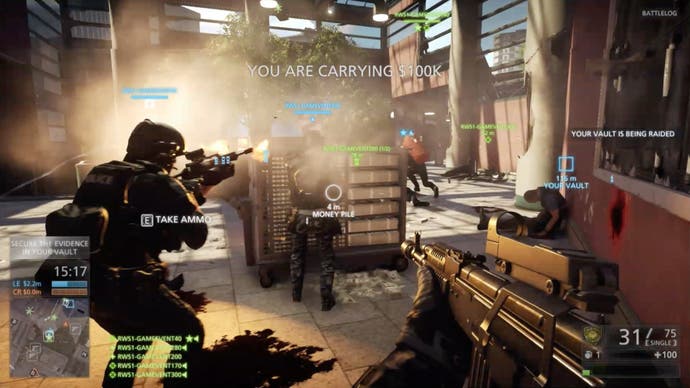
The arsenal on offer is less exotic, with a definite bias in favour of pistols, shotguns and rifles over grenades and rockets. Those are still used, of course - how could it be Battlefield if not? - but they're not as common, and are most often limited use items picked up from weapon lockers in the field than standard pieces of kit taken into battle by default.
Vehicles, too, skew towards to the domestic. There are no tanks or jets, and the helicopters on offer don't come equipped with the same array of offensive options that a military pilot would take for granted. Manned guns on either side are all you get, and while these can be upgraded to bullet-spewing miniguns, they won't allow you the same guaranteed aerial domination as an expertly piloted attack chopper in Battlefields past.
The closest the game comes to really sinking its teeth into the idea of cops and criminals is in some of the new play modes. Crosshair is a short, punchy mode with small 5v5 lobbies and a strict no respawn rule. One player on the cop team is designated as a witness who must reach the other side of the tight map in order to escape. The other cops must protect them, the criminals must stop him.
There's a real sense of purpose and intimacy to this mode that lends itself well to the police setting. It feels like a genuine scenario that cops might face - or at least that movie and TV cops might face - and engagements are fast, brutal and thrilling as you work out new paths through the narrow environments you've been given.
Rescue is similarly focussed in scope, though has larger maps to play with. Here, criminals must guard two hostages, while cops try to rescue at least one of them to win. This is one of the only modes where it feels like strategy and methodical advances really work. As such, it's a mode where new class type, Professional, really comes into their own, thanks to a skill-set which favours stealth and reconnaissance.
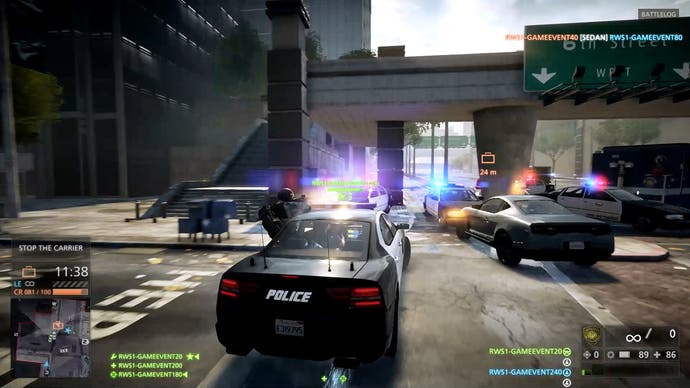
Less successful are the modes that should have been the beating heart of the Hardline multiplayer experience. Heist promises much, but ultimately ends up as a slight variation on Capture the Flag. Criminals must bust into a location and then ferry bags of money to an escape point. Cops, of course, have to stop this from happening.
There's just not much strategy to it, as the actual heist element - the breaking into the vault - is over in seconds. What remains is grabbing items and running to a mission marker under fire, which isn't distinctive enough to really sell the bank job aspect. Certainly, those who have been deep in Payday 2 - and even GTA Online's similar challenges - will find it to be a shallow and overly simple simulation of this popular criminal fantasy.
Also struggling to escape the gravitational pull of Capture the Flag is Blood Money. This is broadly similar to Heist, but has both cops and criminals swiping from the same pile - loot for crooks, evidence for cops. Each must then return it to their own vault, from which the other team can steal if they're feeling especially cheeky. Blood Money is more lively and frantic than Heist, with the need to protect one spot while raiding another, but while it certainly entertains I can't see many players choosing it as their mode of choice.
Team Deathmatch, of course, is Team Deathmatch.
Which leaves just two modes that feel genuinely essential. One of these is inevitably Conquest, the core Battlefield mode that has endured for a very simple reason: it's awesome.
The carnage is somewhat muted by the lack of heavy ordnance and serious hardware, but it remains the mode in which all of Battlefield's systems click into place. Whichever class type you play as - the medic-styled Operator, the Mechanic, support class Enforcer or the aforementioned Professional - you'll find a niche for your evolving abilities and gadgets in Conquest's fearsome tempest.
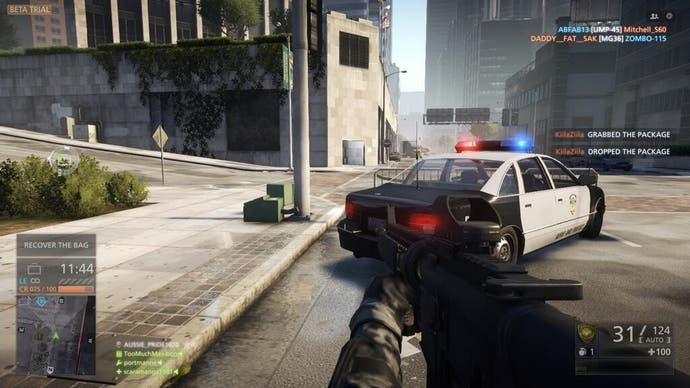
In terms of maps, Riptide and Hollywood Heights are the standouts for Conquest. Each has generous external areas for those rampaging around in vehicles, and centres on a building - or clusters of buildings - any one of which would be large enough for a map in its own right in most other shooters. It's that dizzying change in scale that really makes Battlefield work, that ability to go from soaring over explosive mayhem in a helicopter to creeping through a claustrophobic interior hunting a single enemy in the space of a few minutes, and these are the maps where that aspect of the game really sings.
It is, ultimately, just Conquest though. That sounds a little dismissive for one of the most entertaining multiplayer game modes around, but its rhythms are familiar now and the switch to criminal rather than military skirmishes hasn't really changed that. You can taser an enemy and "interrogate" them to reveal the location of their squad members on your map, but that thin nod to non-lethal techniques is as close as it comes to acknowledging that you're not playing as opposing armies.
The only new addition that Hardline brings to the table which really sticks - and which really deserves to be included in future iterations of the series, military or not - is Hotwire.
This is, in theory, the exact same thing as Conquest. Each side tries to take command of different control points on the map - and the more you hold, the faster the other team's tickets deplete. The difference, and it's a brilliant one, is that the control points are vehicles. In order to capture them, you have to get in and drive. And keep driving. You'll only earn points, and retain command, if the vehicle is moving at speed. In other words, you can't drive to an out of the way spot and hide, clocking up score without doing anything.
The vehicles used for the control points run the gamut from motorbikes to oil tankers. Only helicopters are omitted, for the sake of fairness. That means success is less about camping in specific spots, and more about good driving and smart teamwork. Others can join you in your mobile control point, leaning out of the windows to return fire on attackers, while a Mechanic can repair the vehicle from the inside.
There are some wobbles. Too many Hotwire maps have roads that lead you outside of the play area, resulting in a frantic and annoying scramble to turn around and return to the play zone. In a mode where driving hell for leather is essential, that feels like a poor design choice. You may also find that control point vehicles get lodged awkwardly in the scenery more often than you'd like. Get the combination right, however, and you've got an absolutely thrilling chase scenario that takes the best elements of Battlefield and completely refreshes them. All of my favourite "holy s***" moments in Hardline have come while playing Hotwire.
Those moments have, thankfully, been unsullied by server issues. Over a week of solid online play on public retail servers, the lobbies have been consistently full, with players from all over the world, and games have always started immediately. There have been no dropped connections, and only occasionally noticeable moments of lag. Whatever else you might say about Hardline, it seems to have beaten the bugs that mired Battlefield 4 for so long.
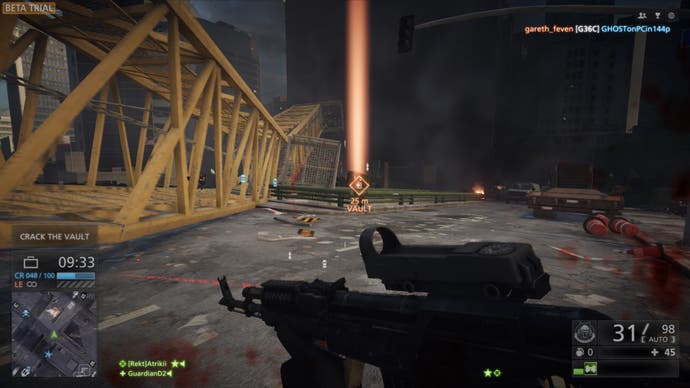
Also seemingly revamped is the levelling up system. There's an intricate web of unlocks at work in the game, with different classes, weapons and vehicles all having their own progression depending on use, as well as an over-arching XP level and an ambient Reputation system.
The Reputation is particularly interesting, shunting class perks such as faster reload or more grenades over to a match-by-match reward tier. Rather than equipping such boosts and taking them into battle, you must earn them anew each time by performing consistently well. It's a clever way of preventing players from resting on their laurels, while also taking some of the standard performance enhancers into a more meritocratic space.
More controversial will be the use of Boosts. These are earned from the bronze, silver and gold Battlepacks earned during the campaign as well as for completing challenges in multiplayer. Boosts apply percentage increases to your scoring across categories such as teamwork, objectives and vehicles. In other words, activate a 50% Teamwork boost and you'll gain additional points every time you get an assist or support score in subsequent matches.
In a nice touch, the boosts can be activated on a class by class basis, and the timer for them is based on time played, not real time. In other words, you can activate a 200% Objective boost for your mechanic class that lasts for thirty minutes, but those minutes only count down while you're actually playing as a mechanic. My concern is that using these boosts can really accelerate you through the ranks.
I went from Level 7 to Level 20 in the space of a few hours by using them, and while I did have to think carefully about the modes I was playing, and how I was playing those modes, it did leave me feeling like Lance Armstrong when I constantly sat at the top of the post-match leaderboard with scores more than double everyone else, despite not having played technically any better.
There's much to like about Hardline, but most of that is stuff that has been inherited from the existing Battlefield template. The shift to urban law enforcement has limited the toys we get to play with, but there's been no comparable evolution in the gameplay to compensate. Context and content feel out of sync, and the feeling that it's more of the same, but with less to do, creeps in. While none of the multiplayer modes is a wash out, only a couple of them really stand out and hint at genuine inspiration for how this venerable series can evolve in the future.
Hardline is a solid entry in the series, and the fact that it seems to have launched without technical issues is notable though not really something that should need to be commended. It's doubtful that it will end up as more than a stopgap for fans, however.
